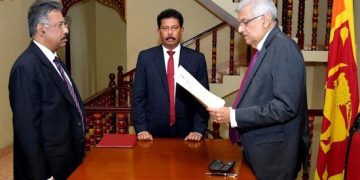Prime Minister Ranil Wickremesinghe was sworn in as Sri Lanka’s interim president Friday until Parliament elects a successor to Gotabaya Rajapaksa, who resigned after mass protests over the country’s economic collapse forced him from office. Wickremesinghe was acting president since Rajapaksa fled the country on Wednesday after angry protesters had stormed his official residence. Speaker Mahinda Yapa Abeywardana said Parliament will convene to choose a new leader and within seven days a new president will be elected. Sri Lankans have been waiting for a formal announcement confirming their president had resigned after he fled to Singapore to escape anti-government protests triggered by his country’s dire economic crisis.
Rajapaksa’s departure came after months of protests over what critics said was his mismanagement of the island nation’s economy, leading to severe hardships for its 22 million people. The parliamentary speaker’s office said Rajapaksa had emailed his resignation and it would be examined before a formal announcement — expected on Friday — is made.
“The authenticity and the legality of the email will have to be checked out” before being formally accepted, the speaker’s spokesman Indunil Yapa said.
Rajapaksa would be the first president to resign since Sri Lanka adopted a presidential system of government in 1978.
At a seafront boulevard that has served as the headquarters of a protest movement seeking to oust him, a small crowd gathered its remaining strength late Thursday to celebrate his resignation.
Only a few hundred people were there to mark the major milestone, with many veterans of the protest movement exhausted after enduring tear gas barrages and tense confrontations with security forces in the preceding days.
But the lack of a formal announcement of his resignation injected a note of caution into the celebrations.
“I certainly feel, I think the crowd here definitely does feel, quite happy about it,” activist Vraie Balthaazar said.
“But at the same time, I think there’s also, until we see the letter, there’s always a sense of apprehension.”
Under Sri Lanka’s constitution, Prime Minister Ranil Wickremesinghe — whose resignation is also being demanded by protesters — would automatically become acting president until parliament can appoint a successor.
Rajapaksa, his wife Ioma and their two bodyguards arrived in Singapore from the Maldives on board a Saudia airline flight.
As president, Rajapaksa enjoyed immunity from arrest, and he is understood to have wanted to go abroad before stepping down to avoid the possibility of being detained. The former Maldivian president Mohamed Nasheed is believed to have played a behind-the-scenes role in getting him out of the country, and said Rajapaksa feared he would be killed if he remained.
“I believe the President would not have resigned if he were still in Sri Lanka, and fearful of losing his life,” Nasheed tweeted. Singapore’s foreign ministry confirmed Rajapaksa had been allowed to enter the city-state for a “private visit,” adding: “He has not asked for asylum and neither has he been granted any asylum.” – Agencies
- Latest
- Trending




